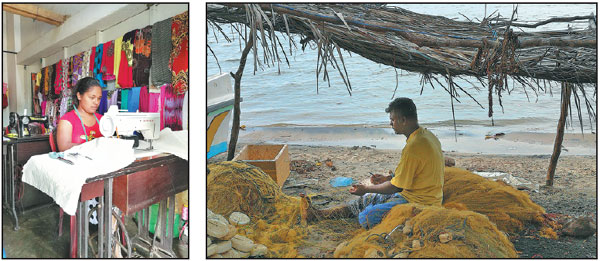As sea ails, it's sewing machines to the rescue
By Zhao Xu ( China Daily ) Updated: 2017-04-22 07:09:52
|
From left: With their sewing, the women try to recoup the income their families lose as a result of adhering to fishing rules; a fisherman repairs a net. Photos by Zhao Xu / China Daily |
So any way of compensation must be self-sustainable in the long term for it to have real effect. Bearing in mind that the village is made up of more than 70 fishing families, many others are clearly watching. And remember: even if continued supply of sewing machines is a nonissue, it will still take a lot of training and willingness for all the housewives to go into tailoring and sewing. And if they indeed do, the whereabouts of a market is the next question. Local NGOs are now working to increase sales, through their own connections. But again, for the business to be sustainable the products would have to be more appealing - more design conscious with better handiwork.
Project managers are also hoping that a self-governing body among villagers will take disciplinary action in the case of illegal fishing. For the moment, they are pinning their hopes on the Fishermen's Society, a grassroots organization with a presence in almost every village in the region.
"These days, with smartphones, GPS and everything, it is increasingly hard to capture those engaged in illegal fishing," said Arjan Rajasuriya, of the International Union for Conservation of Nature, an international NGO working with the UNEP on the dugong project.
"Fishermen out at sea are alerted even before the protectionists and the coastal police jump into their speed boat," Rajasuriya said.
For the past 30 years, Rajasuriya, a coral reef scientist born in Sri Lanka who underwent university education in Australia, has been involved in protecting the region's marine environment.
"Chasing those fishermen could be highly dangerous - many of them are equipped with dynamite, which they also use in illegal fishing. They could throw one at you, and the chances are that you'll fall off the boat 30 kilometers offshore."
Dynamiting as a means of illegal fishing started as far back as in the 1950s and 60s, with the dynamite obtained from local stone quarries, he said. These days dynamite is often smuggled into Sri Lanka from nearby countries, India and Indonesia for example.
Organized criminals, corruption and government inaction have made it difficult to make progress on the issue, he said.
"There's a political network behind this."
Laksman Peiris, deputy director of the country's Wildlife Conservation Department said the government is doing its utmost to protect the sea, but he admitted that corruption exists and that streamlining is required if different government departments, his own department and the Department of Coastal Conservation, for example, are to work closely and effectively.
|
|
|
|
|
|
|
|


























 Raymond Zhou:
Raymond Zhou: Pauline D Loh:
Pauline D Loh: Hot Pot
Hot Pot Eco China
Eco China China Dream
China Dream China Face
China Face






